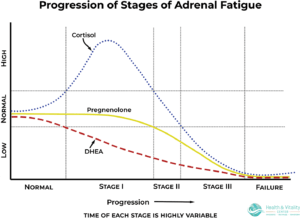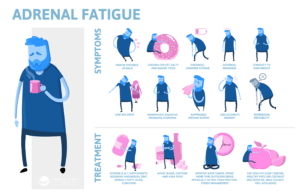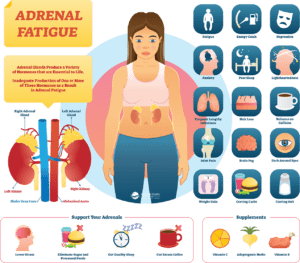Adrenal Health Check: What is Adrenal Fatigue?
Adrenal fatigue is the burn out of your adrenal glands causing fatigue, it manifests in three stages. The adrenals are two small walnut-shaped glands sitting on top of each kidney. Prolonged emotional stress, poor sleep quality, blood sugar fluctuations, and inflammation can burn out your adrenal glands and cause fatigue.
What are Early Signs of Adrenal Fatigue?
Early indications of adrenal fatigue include elevated morning cortisol levels and decreased afternoon cortisol levels, leading to an energy crash in the afternoon. This is then followed by another cortisol spike at night, which can lead to difficulty sleeping (insomnia.) Persistent elevation of cortisol levels leads to sustained high blood sugar levels. Once glucose reserves in the body are depleted, it begins breaking down proteins (muscles) to obtain sugar.
This diagram illustrates the common pattern of the hormone cortisol through the stages of adrenal fatigue. The total cortisol levels rise and then fall as the stages of exhaustion progress from left to right.

What Are The 3 Stages of Adrenal Fatigue?
Stage 1: Acute Adrenal Stress – “Superman Complex”
Stage 1 of adrenal fatigue is caused by a reaction to high-stress such as divorce, high-stress job, loss of job, loss of a loved one, major personal injury, or the birth of a child. These reactions increase cortisol levels and decrease the DHEA hormone. Elevated cortisol causes sleep disturbances, insomnia, and immune suppression.
Stage 2: Mild Adrenal Fatigue – “Sometimes Cranky”
In Stage 2 of adrenal fatigue, cortisol levels decline throughout the day but rise at night. Cortisol rhythm becomes irregular, and other hormonal irregularities occur. Depression, sweet cravings, decreased sex drive, insomnia, poor memory, anxiety, recurrent infections, inability to lose or gain weight, and joint or muscle pain are the manifestations of this stage.
Stage 3: High Adrenal Fatigue – “Down & Out”
In Stage 3 of adrenal fatigue, the crash stage, the adrenals fail to meet the body’s needs and can no longer produce cortisol. Therefore, the cortisol level is low all day and all night. Chronic fatigue and inability to perform routine daily activities or work-related duties will occur.

What are Signs and Symptoms of Adrenal Fatigue:
- Insomnia
- Anxiety/Nervousness
- Decreased ability to handle stress
- Hormonal imbalance
- Poor memory
- Weight gain
- Reduced sex drive
- Difficulty waking in the morning
- Lack of energy in the morning and in the afternoon
- Feeling better temporarily after a meal
- Low blood pressure
- Lightheadedness when rising from a horizontal position
- Abnormal blood sugar
- Carbohydrate or salt cravings
- Joint or muscle pains
- Frequent respiratory disorders with symptoms lasting longer than typical
- Immune system suppression
- Loss of body hair
How is Adrenal Function evaluated?
During adrenal function testing, cortisol levels are evaluated through the collection of four saliva samples: upon awakening, lunchtime, mid-afternoon, and before bedtime.
What is Adrenal Fatigue Treatment?
At the Health and Vitality Center in Los Angeles, one of the ways we support the adrenal glands is through IV vitamin therapy.
When treating stage 1 of adrenal fatigue, Doctor Lalezar recommends the Myers’ Cocktail, a Vitamin IV therapy of Magnesium and B Vitamins to calm the adrenals, reduce the production of cortisol, and alleviate stress.
For stages 2 and 3 of adrenal fatigue, we use Vitality drip, which consists of 15-30 grams of vitamin C, minerals, B vitamins, Zinc, Chromium, Magnesium, and Calcium. High-dose vitamin C replenishes the adrenal glands.
Additionally, we may recommend IV Glutathione to treat adrenal fatigue. Glutathione consists of three amino acids and is a very powerful antioxidant to support the adrenal glands. Different oral supplements may also be recommended for different stages of Adrenal Insufficiency. These could include phosphatidylserine, adaptogens, theanine, skullcap, licorice, and adrenal concentrate.
As a last resort, Doctor Lalezar may prescribe physiologic doses of Hydrocortisone to help heal the adrenal glands and counteract fatigue. Please refer to Dr. William Jeffries’s book “Safe Uses of Cortisol.”

Holistic Adrenal Fatigue Treatments with Dr. Lalezar
Call the Health & Vitality Center of Los Angeles at 310-477-1166 or click here to schedule an appointment. Doctor Shiva Lalezar will treat the underlying causes of your Adrenal Fatigue. She employs an integrative approach, combining the best conventional therapies with the latest techniques and treatments in Functional Medicine for optimal results.
We are one of the leading centers for natural medicine in Los Angeles and have many years of experience treating fatigue. Doctor Shiva Lalezar treats your adrenal fatigue holistically and will shortly get you back to normal.
Our practice uses an integrative approach, combining the best conventional therapies with the latest techniques and treatments in Functional Medicine for optimal results.
Quick Answers
General Questions?
What is adrenal fatigue?
Adrenal fatigue is a term used in functional medicine to describe a state where the adrenal glands, responsible for producing stress hormones like cortisol, become overwhelmed and underperform due to chronic stress. While not formally recognized by conventional medicine, it’s thought that ongoing stress and a lack of recovery can disrupt cortisol production, leading to symptoms like fatigue, brain fog, and anxiety. In functional medicine, adrenal fatigue is approached holistically, focusing on stress reduction, dietary changes and supplementation, and lifestyle modifications to support adrenal health and overall well-being.
What causes adrenal fatigue?
Adrenal fatigue is believed to result from prolonged stress exposure, whether emotional, physical, or environmental. When the body experiences chronic stress, the adrenal glands work overtime to produce cortisol, the primary stress hormone. Over time, this constant demand can lead to imbalances in cortisol levels, affecting energy, sleep, and resilience. Functional medicine addresses these stressors by evaluating lifestyle factors, diet, and underlying health conditions, aiming to restore balance through stress management techniques, nutritional support, and adequate rest.
What are the symptoms of adrenal fatigue?
Common symptoms of adrenal fatigue include persistent fatigue, sleep disturbances, difficulty waking up, cravings for salty or sugary foods, brain fog, and feeling overwhelmed or unable to handle stress. Symptoms can vary widely and resemble other conditions, making it essential to approach them holistically. Functional medicine practitioners evaluate these symptoms in context, examining lifestyle, diet, and mental health to address root causes and recommend personalized therapies, including dietary changes and stress management.
How is adrenal fatigue diagnosed?
While adrenal fatigue is not officially recognized in conventional medicine, functional medicine practitioners may use saliva or blood tests to measure cortisol levels throughout the day. This testing can provide insights into cortisol patterns, helping practitioners identify imbalances. Diagnosis typically also includes a thorough lifestyle assessment, stress history, and symptoms, allowing a tailored treatment approach that considers biological and environmental factors impacting adrenal function.
How does adrenal fatigue impact overall health?
Adrenal fatigue can ripple effect on overall health, potentially leading to weakened immune function, hormonal imbalances, blood sugar instability, and mood disturbances. When the body’s stress response is compromised, it may struggle to regulate inflammation, energy, and other vital processes. Functional medicine treats adrenal fatigue as a whole-body issue, focusing on restoring balance by addressing stress, nutritional deficiencies, and sleep, thereby supporting energy and resilience.
What role does cortisol play in adrenal fatigue?
Cortisol, the body’s primary stress hormone, helps regulate metabolism, blood sugar, immune response, and stress adaptation. Cortisol production may become dysregulated in adrenal fatigue, either too high or too low, depending on the stage. Functional medicine uses cortisol level testing and symptom assessments to understand individual needs and recommends lifestyle changes, adaptogenic herbs, and nutrition to restore optimal cortisol rhythms and improve the body’s stress resilience.
How can diet support adrenal health?
A nutrient-rich, balanced diet supports adrenal health by stabilizing blood sugar levels and providing essential vitamins and minerals. Foods rich in B vitamins, magnesium, and vitamin C are especially beneficial, as these nutrients help manage stress and support adrenal function. Functional medicine emphasizes whole, unprocessed foods, reducing sugar and caffeine intake, and eating balanced meals to stabilize energy and support hormone balance, vital for adrenal recovery.
What lifestyle changes and stress management help manage adrenal fatigue?
Lifestyle changes are crucial for adrenal recovery and may include improving sleep hygiene, practicing mindfulness, and incorporating regular but moderate exercise. Functional medicine also encourages activities like yoga, meditation, and deep breathing exercises to lower cortisol and reduce the effects of chronic stress. By establishing consistent routines and managing stress levels, individuals can support adrenal function and create a foundation for long-term resilience and energy.
How does sleep affect adrenal fatigue?
Sleep plays a vital role in adrenal health, as during rest, the body repairs and balances hormone levels, including cortisol. Poor sleep or irregular sleep patterns can increase stress on the adrenal glands, worsening symptoms. Functional medicine emphasizes sleep hygiene practices—such as creating a calming bedtime routine, reducing screen time, and optimizing bedroom conditions—to ensure restful sleep, allowing the adrenal glands to recover and restore balance.
What are adaptogens, and how do they support adrenal fatigue?
Adaptogens are a class of herbs, like ashwagandha, Rhodiola, and holy basil, known for their ability to help the body adapt to stress by balancing cortisol and other stress-related hormones. Functional medicine practitioners often recommend adaptogens as part of a holistic approach to adrenal fatigue, as they can enhance resilience, reduce fatigue, and support mental clarity. They are used alongside lifestyle changes and nutritional support to promote a balanced stress response and improved adrenal health.
Can adrenal fatigue be reversed?
Adrenal fatigue can be managed and potentially reversed with a holistic approach addressing the root causes. Functional medicine practitioners focus on restoring balance through lifestyle adjustments, diet, supplementation, and stress management techniques. Recovery can take time, but individuals often experience energy, mood, and overall resilience improvements with a personalized plan and consistent efforts.
Is adrenal fatigue related to thyroid function?
Yes, adrenal fatigue and thyroid function are interconnected; when one is under strain, it can impact the other. Chronic stress and adrenal imbalances can disrupt thyroid hormones, leading to symptoms like low energy and metabolic issues. Functional medicine considers both the adrenal and thyroid systems when addressing adrenal fatigue, often supporting both with nutrient-rich foods, adaptogens, and hormone-balancing strategies to promote overall endocrine health.
What supplements can support adrenal health?
Functional medicine practitioners often recommend supplements like vitamin C, B vitamins, magnesium, and adaptogenic herbs to support adrenal health. These nutrients and herbs are vital for stress response, energy production, and hormone balance. Each person’s needs vary, so practitioners tailor supplement plans based on individual symptoms and test results, ensuring balanced support for adrenal recovery.
Because each person’s needs vary, how long does it take to recover from adrenal fatigue?
Recovery time for adrenal fatigue varies depending on the individual, the severity of their symptoms, and their commitment to lifestyle changes. Some people see improvements within a few weeks, while others may take months to recover fully. Functional medicine practitioners create personalized plans and support patients through each stage, emphasizing patience and consistency to achieve sustainable recovery.
Why is blood sugar stability important in functional medicine’s approach to adrenal fatigue?
Unstable blood sugar increases stress on the adrenal glands. Functional medicine emphasizes balanced meals with protein, healthy fats, and fiber to stabilize blood sugar and reduce cortisol fluctuations, supporting adrenal health.
According to functional medicine, what are the benefits of balancing cortisol levels for overall health?
Balanced cortisol levels enhance energy, mood stability, immune response, and resilience to stress. Functional medicine views cortisol balance as foundational to physical and mental well-being, supporting optimal adrenal function.
How does functional medicine view the connection between gut health and adrenal fatigue?
Gut health is critical for stress resilience and nutrient absorption, both essential for adrenal health. Functional medicine practitioners often include probiotics, a balanced diet, and gut-healing protocols to support adrenal recovery.
Is functional medicine effective for managing adrenal fatigue in high-stress lifestyles?
Yes, functional medicine is effective in helping individuals with high-stress lifestyles. It focuses on resilience-building practices, stress management, and nutrition to optimize adrenal function and reduce burnout.
What role does hydration play in managing adrenal fatigue in functional medicine?
Adequate hydration supports blood pressure and energy levels, often affected by adrenal fatigue. Functional medicine emphasizes proper hydration as a simple yet effective way to support adrenal health and resilience.

Have additional questions?
We’re here to help. Let’s talk.
Testimonials
Contact






